Irredeemable Rakes and Rogues-Dark Heroes?
I had this post up on Embracing Romance last week. But since then, I sat in on a workshop and learned the difference between a dark hero and an anti-hero.
The dark hero might have some unsavory or negative traits, but in the end, he does the right thing; at least part of the time. The Anti-hero doesn’t and he doesn’t give a rats whisker that he doesn’t.
What makes a rake or rouge irredeemable? Is there such a thing? If so, what is it?
Those are questions I asked myself as I created Heath, Earl of Ravensdale, my darkest hero yet. His story, Wagers Gone Awry (Conundrum of the Misses Culpepper, Book 1) just launched, and I do worry readers won’t warm up to him.
Like most haunted heroes, he has redeeming qualities, but are his strengths enough to overcome his blatant faults? I don’t see Heath as the classic anti-hero, like Erik, the Phantom of the Opera or Jason Bourne in The Bourne Trilogy, but he’s not the smiling conqueror to the rescue either.
He’s more like, “Bloody hell, won’t do to send five penniless females packing, more’s the pity.”
Perhaps the humanity of rakes and rogues, those rakehells who are often perceived as part rebellious, part selfish, and part bad boy is what makes them so intriguing. But at what point do they cross the line into hopeless creeps? Is that a purely individual perception of each reader?
Romance readers enjoy escaping from reality by delving into a well-written story, yet the characters must still be believable. Oh, we’ve all read about the swearing, cocky, indifferent hero who will watch his enemy perish with a half-smile on his perfectly molded mouth, yet he’ll rush to the aid of a duckling crossing the road.
Won’t he?
Flaws make our champions human, but how human do we want them? Let’s face it, the world is full of scumbags (rich, sexy, handsome and poor, balding, and pudgy). Do readers want to read about those kinds of lowlifes? More on point, can readers relate to them as the protagonist? Libertines do exist, after all.
If the roué is contrite and apologetic, can we let him start anew? What if he repeats his poor behavior? Again and again?
I know the troll reviewers who insists every woman born since the inception of time who doesn’t bash men over their heads when they do something she doesn’t like is screeching, “Off with his…”
Well, you get the idea.
She’s also calling the rest of us and our forgiving heroine’s doormats. Are we?
What about the average reader? You know, the one who if he/she doesn’t want a happily-ever-after, at least wants to like the hero by the end of the story.
I’ve read a few books where I didn’t like him (or her) even after I reached the last page. I’m not sure that’s the authors fault. After all, don’t we each have some things that bother us more about people than others? I’ve had readers rave over a hero while others have basically said he was a sorry sot. Still, I don’t like how I feel after finishing a story when I didn’t care for the hero.
For me, an irredeemable rake or rogue is one who continues to put his needs and wants above everyone else’s not caring who he hurts, and he’s also unreliable and untrustworthy.
What about you? What’s your deal-breaker, the thing that makes you want to slap a hero upside the head and say, “Wake up, you insufferable cad!”?
Remember, you’re automatically entered in the April drawing for a $5.00 gift card just for commenting.
Enter my Rafflecopter drawing for a $25.00 gift card or one of two autographed copies of Wagers Gone Awry HERE
Don’t forget to join me and 10 other historical romance authors for an evening of fun!
We are giving away all kinds of stuff, and my humor will be working over-time, I promise!

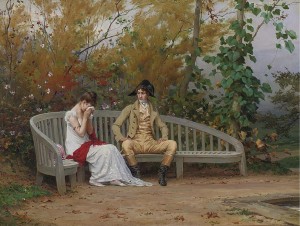
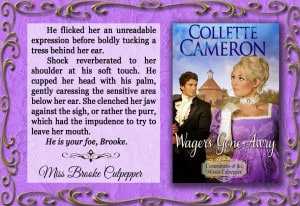
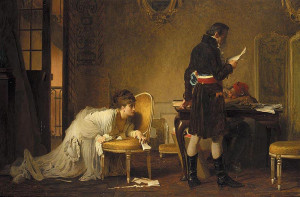
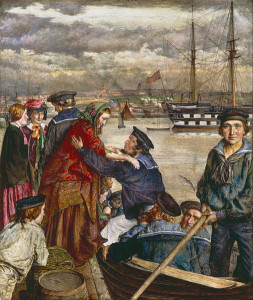
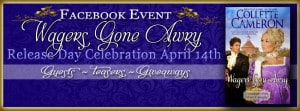

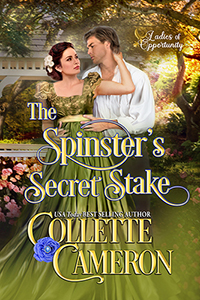
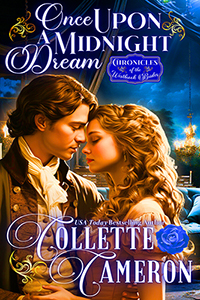
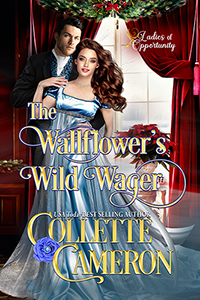



Heath was likable even before he did the right thing for the Culpeppers because he showed concern for his horse. That showed that there was a glimmer of goodness in him.
Ah, you caught that! Good. I put a few things like that in there.
Redeemable rakes will do good things–whether it’s expected or just because. Irredeemable will never do the right thing, tends to be very narcissistic, and has a chip on his shoulder–usually a very mean sort.
Denise
The redeemable rake never truly forgets he was brought up to be a gentleman or peer.
They are narcissistic, aren’t they?
If stories didn’t have more human like characters, it would be too boring. There just has to be a good balance. I think a redeemable rake has the perfect balance. He might start out stubborn and annoying(and will have me want to shake some sense into him) but in the end he has a breakthrough moment.
Heath’s thought processes were kind of concerning in the beginning, but he definitely redeemed himself 🙂
I’m not generally a fan of ant-heroes or anti-heroines, so even writing Heath as a dark character was a challenge for me.
Rape is a deal-breaker. And cold-blooded murder of innocents is another. Anything else…well, almost anything else is reversible given enough words and time.
There was a recent debate at Ilona Andrew’s about whether or not Hugh, a long standing nemesis of the main character, was redeemable or not and funnily enough, I think more people said yes than no. Then again, IA did a great job of portraying him as a flawed character who was twisted by things outside his control, so I could see him being redeemed even though Hugh did some pretty amazingly terrible things. On the other hand, it would probably take more than a novel or two or maybe even three to really dig into Hugh and redeem him to the reader’s satisfaction.
I agree, Katie.
I don’t know if it is ever really possible to decide whether a hero (or a villain for that matter) is ever ‘redeemable’ or not, especially when we are trying to view someone from an entirely different culture and to fit them into our current viewpoint of what is acceptable behavior. In some ways, the smaller things that are done, or not done, are harder to evaluate than the more outrageous ones–at least to current mindsets.
Great point about culture. What one culture thinks is normal, another might be horrified at. Makes me think of the first episode of Outlander this season where Jamie spanks Claire. In the Scottish culture, a wife disobeying her husband was due discipline, Claire thought he was barbaric.
I would say a cheating or lying cad 🙂